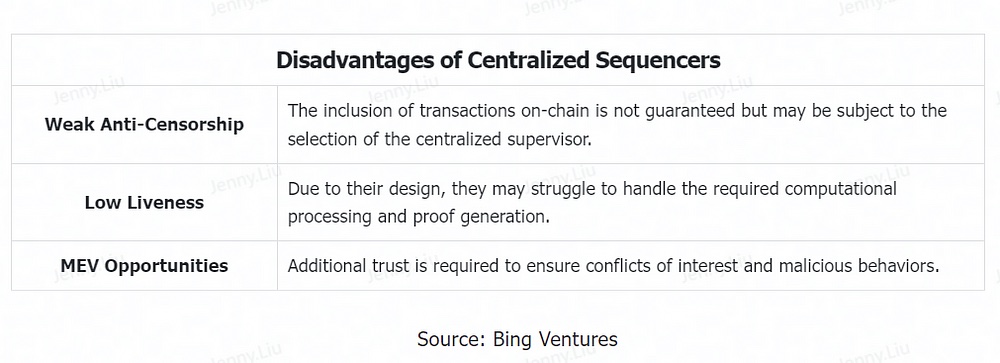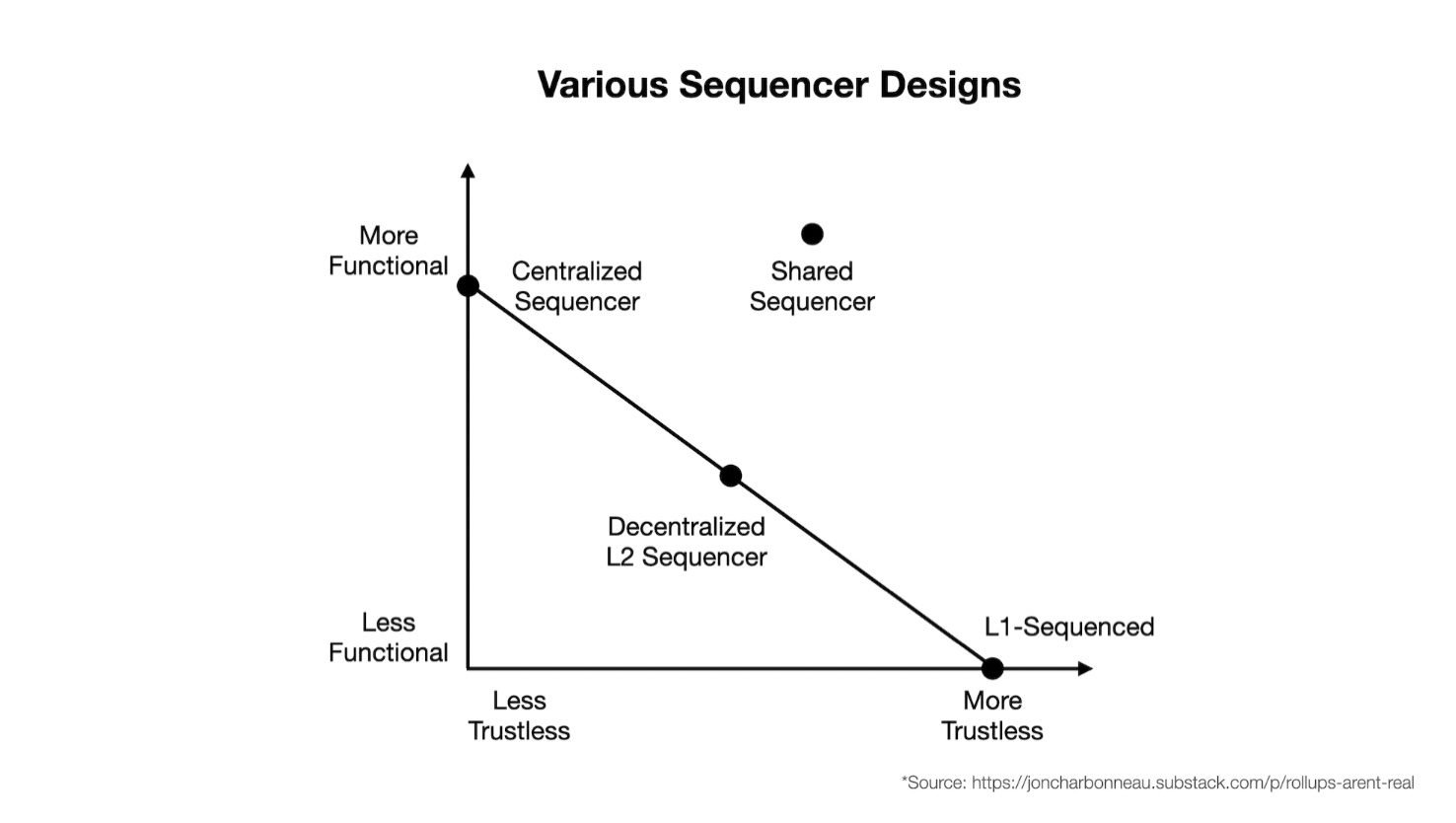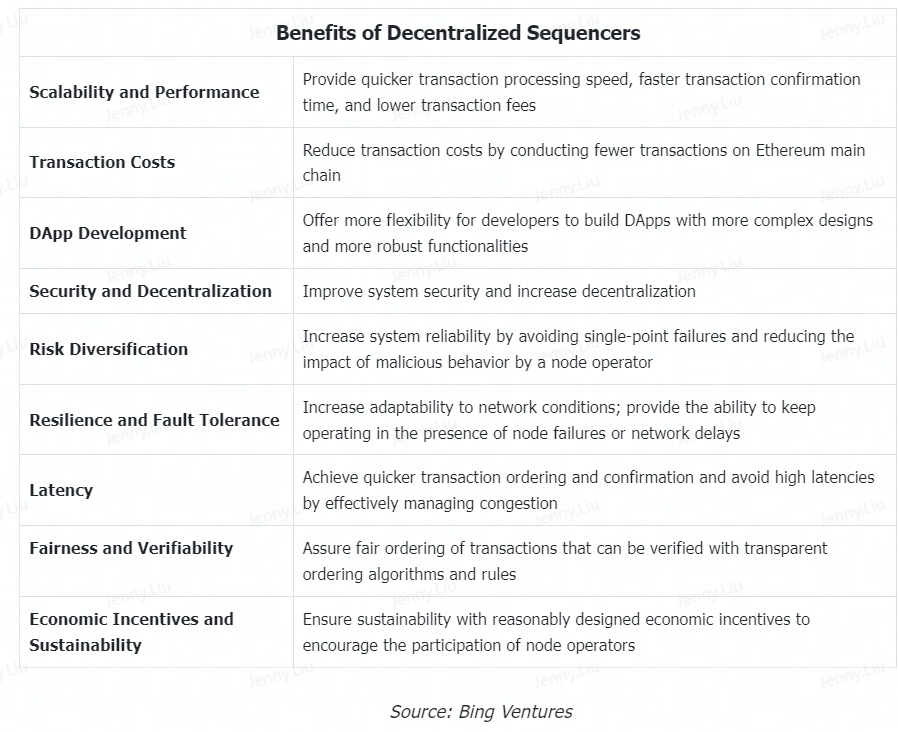HodlX Guest Post Submit Your Post
Sequencers are a core component of rollup networks, responsible for crucial operations including receiving, sorting and executing transactions, as well as submitting transaction data.
If the only sequencer in a network fails or becomes unavailable, the whole network will stop processing transactions.
However, many of the existing rollup solutions only have a single sequencer, making them far less decentralized than some centralized layer-one alternatives.
Therefore, the importance of decentralized sequencers is self-evident, and promising decentralized sequencers should effectively increase the decentralization of a network with optimized design and implementation.
Importance of sequencers
Existing rollup solutions include ZKPs (zero-knowledge proofs) based ZK-rollups and optimistic execution-based optimistic rollups.
These solutions are more scalable than monolithic layer-ones. But they still have their respective issues.
Issues with ZK-rollups
- Computational complexity Using ZKPs to verify the correctness and legitimacy of transactions requires a significant amount of computational resources and time. This may result in transaction-processing delays and high computational costs.
- Dependency on verifiability ZK-rollups rely on external verifiability, meaning that external supervisors are required to verify the correctness of ZK proofs. This may introduce trust issues and centralization risks.
Issues with optimistic rollups
- Reversibility Optimistic rollups work on an ‘optimistic’ assumption that all transactions submitted are valid and conflict-free. However, if there are conflicts or invalid transactions, the entire system may have to roll back and re-execute, leading to uncertainties and processing delays.
- MEV Optimistic rollups may face MEV (maximal extractable value) issues, such as manipulated and unfair transaction ordering.
These issues reduce the performance and security of existing rollup solutions and may impact usability and user experience.
The introduction of new designs like sequencers to improve the performance and decentralization of rollups is key to addressing these issues.
Sequencers can increase throughput and compress transaction data.
Specifically, they order transactions according to predetermined rules, which can not only enhance the efficiency and throughput of transaction processing but also reduce conflicts and competition among transactions.
Sequencers also compress transactions, bundling multiple transactions into a single one, thereby reducing the scale of transaction data.
Such compression helps reduce the costs for on-chain storage and transmission while improving the whole system’s efficiency.
Disadvantages of centralized sequencers
Most of the existing rollup service providers maintain their own centralized sequencers as it’s more convenient and cheaper.
However, the disadvantages are also evident, including but not limited to susceptibility to censorship, excessive fees and opportunities for capturing MEV maliciously.

Sequencer decentralization is considered an important direction for rollup maturing and a promising alternative to avoid the disadvantages of centralized sequencers.
Decentralized sequencers are believed to offer more security, liveness and censorship resistance. But they are not easy to design and implement.
And the best solutions should make wise trade-offs among various factors, including performance, decentralization and security.

Towards decentralization
The current technology for decentralized sequencers is crude and can be improved by finding more effective ordering algorithms, implementing more robust validation mechanisms, creating smarter designs, etc.
We’ve summarized below some meaningful decentralization approaches that are currently being explored.
And as technology evolves, we expect decentralized sequencers to have higher throughput, faster confirmation speed and lower latency as well as higher security and composability.
PoA (Proof-of-Authority)
In this approach, a handful of entities are selected to take turns operating sequencers in a PoA system.
The approach improves censorship resistance and has the lowest latency ut the drawback is it still faces the risk of single-point failure.
Based rollup
In this approach, there are no privileged sequencers, and anyone can submit batches to layer two.
Transaction ordering and block proposing are deferred to the DA (data availability) layer. The advantage is it inherits the liveness and censorship resistance of the DA layer.
But the downside is the proceeds may leak to the base layer, and it is more susceptible to MEV attacks. Also, the confirmation time is long.
DVT (distributed validator technology)
With DVT, the responsibilities of running a single sequencer can be distributed across a cluster of machines and node operators.
Each node operator can sign independent attestations using their fractional share of the validator key.
This approach offers the flexibility to be plugged into other solutions, but it introduces a little latency.
Shared sequencing
This solution allows many rollups to share a single decentralized network of sequencers.
This shared sequencer network processes transactions on several chains in parallel and provides cross-chain atomicity, real-time censorship resistance and strong economic security at the sequencing layer.
Shared sequencers have the network effect of serving multiple chains, but they are still limited by the layer-one’s data and transaction ordering throughput.
Bootstrapping new sequencer sets
This approach creates a decentralized sequencer group without permission using token incentive mechanisms.
This approach involves creating a decentralized sequencer set permissionlessly by adopting token incentives.
The advantage is increasing token utility, but the downsides are the latency and the difficulty of implementation for lesser-known rollups.
Despite the benefits offered by decentralized sequencers, each technical approach has its own tradeoffs.

Potential opportunities
Now, let’s take a step back and ask the question of whether decentralized sequencers can permanently solve Ethereum’s problems.
Do they at the same time introduce hidden risks to Ethereum?
Firstly, for solutions that utilize the Ethereum layer-one for sequencing such as based sequencing, the rollup system’s performance will be fundamentally limited by the throughput on layer-one and can only alleviate computational bottlenecks and achieve small factor improvements in communication complexity.
Secondly, network conditions are also an important consideration.
The stability and synchronicity of the network will directly impact the liveness and security of sequencers.
Sequencers will lose liveness when the network behaves asynchronously and fails to respond to transactions timely.
Only in networks with good synchronicity can sequencers maintain reliable liveness degrees.
Therefore, infrastructure could be a potential investment opportunity.
That includes sequencer service providers, security auditors and cross-chain solution providers as well as governance, participation platforms and more.
The solutions offered by these infrastructure providers might solve the problems with existing decentralized sequencing approaches.
But it should be noted that decentralized sequencing is only one possible direction that the Ethereum community is exploring to elevate performance and scalability.
It’s not the only way lso, new solutions will emerge as technology advances.
We expect decentralized sequencing solutions to evolve in the following directions.
Multi-chain interoperability
With the emergence of various blockchains and layer-two solutions, multi-chain interoperability could become an essential aspect of decentralized sequencers.
Future sequencers may need to handle transactions across multiple chains simultaneously and achieve atomic composability to provide smoother user experiences and more powerful functionalities.
Stronger MEV prevention and user protection
Future sequencers would be able to reduce the impact of MEV and better protect users against monopoly pricing.
This may include adopting random ordering mechanisms, reasonable transaction fee mechanisms and improved privacy protection measures.
Enhanced governance and participation
To ensure the fairness and security of decentralized sequencers, future sequencers may introduce stronger governance and participation mechanisms.
This can be achieved through token holder voting, validator elections and decentralized decision-making by participants.
More open and transparent governance mechanisms can promote community participation and drive the development of the system.
In conclusion, as decentralized sequencers continue to evolve, we expect to see more business model innovations.
These may include different transaction fee models and sequencer-based data services and on-chain applications and more.
Innovative business models will provide more economic incentives for sequencers, thereby promoting their widespread adoption and sustainable development.
Kyle Liu is the investment manager at Bing Ventures a pioneering venture capital firm that backs startups and entrepreneurs driving the next waves of Web 3.0 and blockchain innovations and a seasoned crypto analyst and writer. He provides insightful analysis and research on a wide range of topics including market trends, sector analysis and emerging projects.
Follow Us on Twitter Facebook Telegram

Disclaimer: Opinions expressed at The Daily Hodl are not investment advice. Investors should do their due diligence before making any high-risk investments in Bitcoin, cryptocurrency or digital assets. Please be advised that your transfers and trades are at your own risk, and any loses you may incur are your responsibility. The Daily Hodl does not recommend the buying or selling of any cryptocurrencies or digital assets, nor is The Daily Hodl an investment advisor. Please note that The Daily Hodl participates in affiliate marketing.
Featured Image: Shutterstock/Pavel Chagochkin/Vladimir Sazonov











